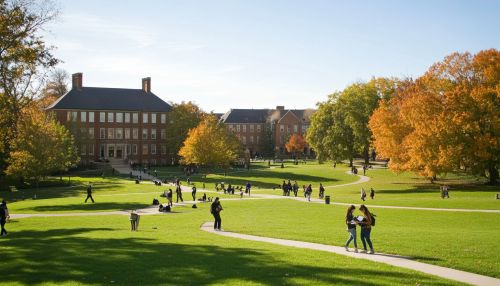Keyishian v. Board of Regents: Difference between revisions
(Created page with "== Background == The case of '''Keyishian v. Board of Regents''' is a landmark decision by the U.S. Supreme Court that addressed the issue of academic freedom and the First Amendment rights of educators. The case was decided on January 23, 1967, and it struck down a series of New York state laws that sought to prevent the employment of "subversive" individuals in public education. The decision is significant for its affirmation of...") |
No edit summary |
||
| Line 23: | Line 23: | ||
The Supreme Court, in a 5-4 decision, reversed the lower court's ruling. Justice William J. Brennan Jr. delivered the opinion of the Court, emphasizing the importance of academic freedom and the need for a robust exchange of ideas in educational settings. The Court found that the New York statutes were overly broad and vague, violating the First Amendment rights of the plaintiffs. | The Supreme Court, in a 5-4 decision, reversed the lower court's ruling. Justice William J. Brennan Jr. delivered the opinion of the Court, emphasizing the importance of academic freedom and the need for a robust exchange of ideas in educational settings. The Court found that the New York statutes were overly broad and vague, violating the First Amendment rights of the plaintiffs. | ||
[[Image:Detail-99493.jpg|thumb|center|A university campus with students walking and studying on the grass.|class=only_on_mobile]] | |||
[[Image:Detail-99494.jpg|thumb|center|A university campus with students walking and studying on the grass.|class=only_on_desktop]] | |||
=== Majority Opinion === | === Majority Opinion === | ||
Latest revision as of 15:35, 30 October 2024
Background
The case of Keyishian v. Board of Regents is a landmark decision by the U.S. Supreme Court that addressed the issue of academic freedom and the First Amendment rights of educators. The case was decided on January 23, 1967, and it struck down a series of New York state laws that sought to prevent the employment of "subversive" individuals in public education. The decision is significant for its affirmation of the principle that the classroom is a "marketplace of ideas" and that academic freedom is a special concern of the First Amendment.
The case arose from a challenge to the Feinberg Law, which was enacted in 1949 and required public school teachers and other public employees to sign loyalty oaths and refrain from membership in any organization deemed "subversive" by the state. The law was part of a broader national trend during the Cold War era, where concerns about communist infiltration led to various loyalty programs and restrictions on public employees.
Case Details
Parties Involved
The plaintiffs in the case included Harry Keyishian, an English instructor at the University of Buffalo, and several other faculty members. The defendants were the Board of Regents of the University of the State of New York and the Commissioner of Education. The plaintiffs argued that the loyalty oath requirements and the associated laws were unconstitutional under the First and Fourteenth Amendments.
Legal Context
The legal context of Keyishian v. Board of Regents involved the interpretation of the First Amendment, which guarantees freedoms concerning religion, expression, assembly, and the right to petition. The case also involved the Fourteenth Amendment, which addresses citizenship rights and equal protection under the law. The plaintiffs contended that the loyalty oath and the associated statutes were overly broad and vague, infringing upon their rights to free speech and association.
Lower Court Rulings
Prior to reaching the Supreme Court, the case was heard by lower courts, which upheld the constitutionality of the New York statutes. The New York Court of Appeals, the state's highest court, ruled against the plaintiffs, affirming the state's interest in preventing subversion within its educational institutions. The plaintiffs then appealed to the U.S. Supreme Court.
Supreme Court Decision
The Supreme Court, in a 5-4 decision, reversed the lower court's ruling. Justice William J. Brennan Jr. delivered the opinion of the Court, emphasizing the importance of academic freedom and the need for a robust exchange of ideas in educational settings. The Court found that the New York statutes were overly broad and vague, violating the First Amendment rights of the plaintiffs.


Majority Opinion
Justice Brennan's opinion highlighted that the statutes in question imposed a "pall of orthodoxy" over the classroom, stifling the free exchange of ideas that is essential to the educational process. The Court held that the laws were unconstitutional because they infringed upon the freedom of speech and association guaranteed by the First Amendment. Brennan noted that the laws' vagueness created a chilling effect, deterring individuals from exercising their rights due to fear of potential repercussions.
Dissenting Opinion
The dissenting opinion, authored by Justice Tom C. Clark, argued that the state had a legitimate interest in ensuring that its educators were not involved in subversive activities. The dissenters believed that the statutes were a reasonable means of protecting the integrity of the educational system and that the majority's decision unduly restricted the state's ability to safeguard its institutions.
Impact and Significance
The decision in Keyishian v. Board of Regents had a profound impact on the landscape of academic freedom in the United States. It reinforced the principle that the First Amendment protects the rights of educators to engage in free expression and association, even in the face of state-imposed restrictions. The ruling has been cited in numerous subsequent cases involving academic freedom and the rights of public employees.
Academic Freedom
The case is often cited as a foundational precedent for the concept of academic freedom, which is the belief that scholars should have the freedom to teach, research, and publish without interference or restriction from law, institutional regulations, or public pressure. The Court's decision underscored the importance of protecting the "marketplace of ideas" within educational institutions, allowing for a diversity of viewpoints and fostering intellectual growth.
Broader Legal Implications
Beyond its implications for academic freedom, Keyishian v. Board of Regents also contributed to the broader legal discourse on the First Amendment and the rights of public employees. The case is frequently referenced in discussions about the balance between state interests and individual rights, particularly in the context of loyalty oaths and other measures aimed at curbing subversive activities.
Subsequent Developments
In the years following the Keyishian decision, the principles established by the case have been applied in various contexts involving the rights of educators and public employees. The ruling has been influential in shaping policies related to academic freedom and has served as a touchstone for legal arguments in cases involving free speech and association.
Related Cases
Several subsequent Supreme Court cases have drawn upon the principles established in Keyishian v. Board of Regents. Notable among these is Pickering v. Board of Education, which addressed the rights of public employees to speak on matters of public concern. The Court's decision in Pickering further clarified the balance between the interests of the state as an employer and the free speech rights of employees.
Legislative Responses
In response to the Keyishian decision, some states revisited their loyalty oath requirements and other statutes aimed at curbing subversive activities. The ruling prompted a reevaluation of the balance between state interests and individual rights, leading to changes in policies and practices related to public employment and academic freedom.
Conclusion
Keyishian v. Board of Regents remains a seminal case in the realm of constitutional law, particularly in the context of academic freedom and the First Amendment rights of educators. The decision's emphasis on the importance of a free and open exchange of ideas within educational institutions continues to resonate in legal and academic circles, serving as a guiding principle for the protection of intellectual freedom.
